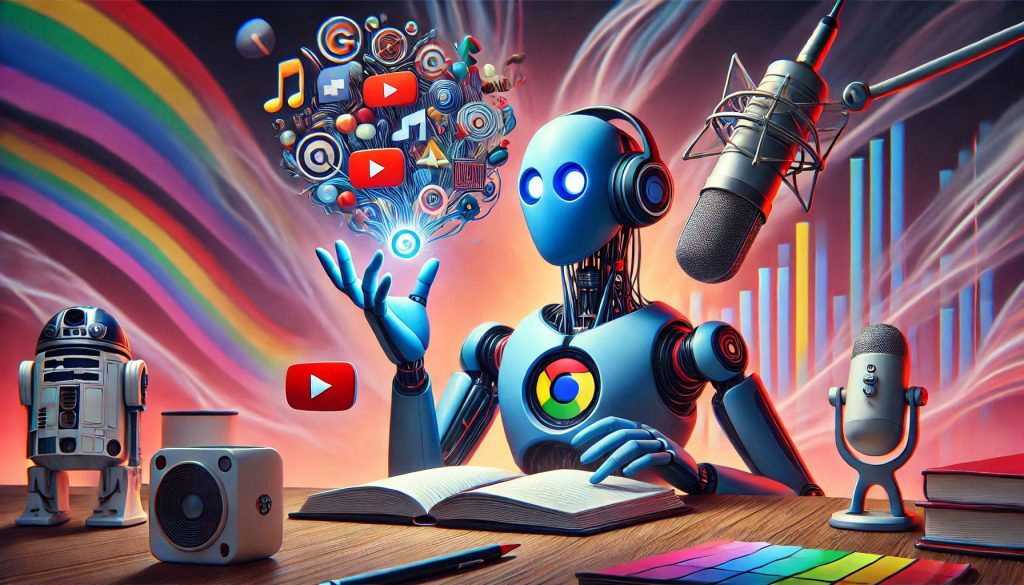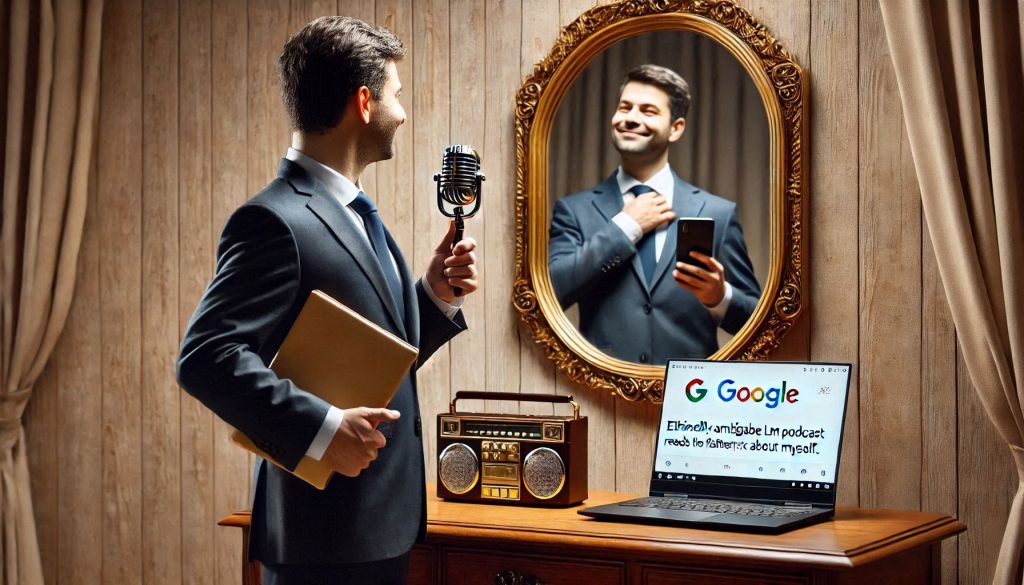A tale of truth and lies. AI

Google’s NoteBook LM: The Game-Changing AI Transforming Podcasts, YouTube Ads, and Voice Technology While Redefining Content Creation
NoteBook LM
Google’s NoteBook LM represents the next leap in artificial intelligence, with its extraordinary ability to synthesize, analyze, and generate text and speech and even add a jokes and targeting a real life comparisons in the surrounding you are living.
Designed as a versatile language model, it is not only redefining creative content production but also has the potential to revolutionize industries like advertising, particularly for podcasts and YouTube videos by leveraging its natural language understanding, NoteBook LM can replicate voices and mimic styles with astonishing accuracy, making it an ideal tool for seamlessly embedding advertisements into digital media.
new era in Google Ads, Ads
This breakthrough might mark the beginning of a new era in Google Ads, where ads are no longer intrusive but rather perfectly integrated into the content, seducing the audience into purchasing products almost subconsciously.
Imagine a future YouTube video where NoteBook LM replicates the host’s voice to pitch a product mid-video. The tone, style, and pacing match the original creator so closely that viewers might not even realize it’s an ad.
Podcast AI ads
Similarly, on a podcast, the AI could insert a highly personalized promotional segment that sounds indistinguishable from the host’s natural commentary.
AI Revolution Boosting Podcast Earnings
These AI-crafted ads could subtly manipulate emotions and trust, creating an advertising experience that feels natural and persuasive. The potential for such innovations is staggering, particularly in their ability to increase engagement and conversion rates. However, with great power comes great responsibility.
Ethical and legal concerns
The implications of this technology raise significant ethical and legal concerns, particularly regarding privacy, voice ownership, and the potential for misuse.
- If AI can perfectly clone a creator’s voice, tone, and style, who ensures this ability is not abused?
- How can individuals protect their voices from being copied or manipulated without their consent
- Without strict guidelines and safeguards, this technology could blur the lines between genuine content and artificial manipulation.
This becomes particularly alarming when considering the potential for impersonation, misinformation, and exploitation. For instance, creators, celebrities, or public figures could see their voices used in ways that tarnish their reputations, misrepresent their views, or worse, fraudulently promote products or ideas they do not endorse. This was started long ago.

The Flattering, Ego-Boosting AI Revolution
To highlight the risks of this powerful technology, consider a hypothetical yet plausible scenario: a politician stands before a mirror, rehearsing a speech and admiring his own reflection. He revels in his accomplishments and envisions his greatness. Meanwhile, an AI-powered podcast powered by NoteBook LM begins narrating a flattering text about his extraordinary achievements and supports his acts . The podcast is filled with exaggerated praise, focusing only on his perceived strengths, unmatched vision, and charismatic leadership. The podcast voices deliveringthese glowing affirmations, making them sound authentic, while also weaving in subtle messages designed to elevate his public image even further. Listeners might interpret this as genuine content, unaware it was crafted entirely by AI to enhance the politician’s self-image and influence.
AI control public perception
Now imagine the misuse of such a tool for campaigns that aim to control public perception or promote specific agendas.
If AI-generated voices are capable of spreading flattery, what stops them from spreading lies?
Without transparency, audiences could be manipulated on a mass scale, undermining trust in media and digital content.
- DAVID Beckham has won a £240million legal battle against dozens of online counterfeiters flogging fakes of his designer gear.
- Scarlett Johansson’s OpenAI clash is just the start of legal wrangles over artificial intelligence
- Spotify making their own AI music under fake artists, and pushing them instead of real ones?
At its best, NoteBook LM can make advertising smarter, more personalized, and more immersive than ever before. For creators and brands, it offers limitless opportunities to engage audiences.
AI narrating

A creator could use the AI to continue narrating a video even after the creator steps away, seamlessly integrating sponsored segments without losing audience attention. For podcasts, the AI could provide localized ads tailored to specific regions, demographics, or listener preferences, all while maintaining the natural flow of the episode. The potential for growth is vast, and such innovations could lead to entirely new forms of monetization and storytelling. AI has unlimited storytelling capabilities for prime users 🙂
Dark side of AI
However, the darker side of this innovation must not be overlooked. To prevent abuse, voice-cloning technology needs strict regulation and transparency. Companies must ensure that AI-generated content is clearly disclosed to audiences. Tools must be put in place to protect creators’ voices, ensuring that no one can replicate them without explicit consent. Additionally, governments and regulatory bodies must work together with tech companies like Google to establish boundaries, ensuring that such advancements are used ethically and responsibly.
AI’s Power to Use Familiar Voices?
Serious discussions about consent, security, and misuse. AI has made significant progress in replicating familiar voices, and it’s becoming increasingly possible to use AI-generated voices to make calls on platforms like WhatsApp and other app’s.
Artificial intelligence complements Loneliness and social isolation

After COVID comes this AI thing. AI can help alleviate loneliness and social isolation by providing virtual companions, assisting elderly care, offering mental health support, and facilitating social connections. While not a replacement for human relationships, AI enhances interaction, accessibility, and emotional support for those in need.
The AI Gold Rush: Innovation Race—Who Will Come Out on Top? No matter what.

In conclusion, AI represents an incredible leap forward in technology and creative possibilities. It promises to transform how ads are integrated into scam, podcasts and videos, offering seamless, immersive, and highly persuasive content. But this power also comes with immense ethical risks. The ability to subtly influence audiences raises fundamental questions about A tale of truth and lies.
Without stringent safeguards, the line between innovation and exploitation could quickly blur, leaving creators, audiences, and even society vulnerable. While NoteBook LM may shape the future of Google Ads and content creation, it is equally essential to ensure that it does so in a way that protects individuals and upholds ethical standards.
photos & illustrations: Microsoft designer